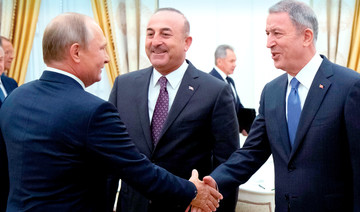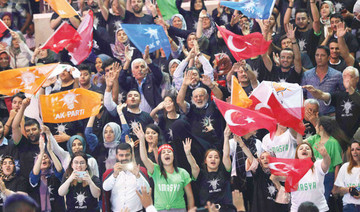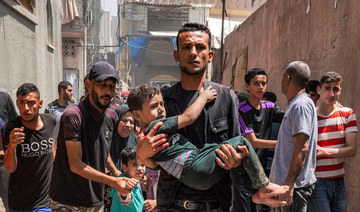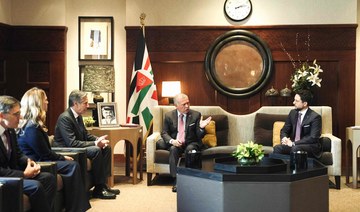ISTANBUL: Relations between Turkey and Russia are cozy, prompting worries in the West of a potentially critical rift in the NATO alliance. But Turkey’s president may be engaged in a balancing act, tactically turning to Russia as ties with the United States further deteriorate over the detention of an American pastor.
President Donald Trump tweeted this month that US-Turkey relations “are not good at this time!” and announced tariff hikes on the NATO ally, precipitating a nosedive in the Turkish currency. Turkish President Recep Tayyip Erdogan was on the phone with Russia’s Vladimir Putin that same afternoon, when they promised more cooperation in the areas of defense, energy and trade.
Switching partners is becoming a familiar dance for Turkey, which is strategically situated between Asia and Europe and often caught in the geopolitical push and pull of the turbulent Mideast region. Despite his country’s economic vulnerability, Erdogan seemed to be signaling that it had alternatives to the traditional alliances that date from its Cold War role as a regional bulwark against Soviet power.
In Turkey’s view, “the US has become even more threatening than Russia” due to strains over critical issues, Sener Akturk, an associate professor of international relations at Koc University in Istanbul, said. The perceived threat makes the US “an ally that has to be paradoxically kept at arm’s length and even balanced against with Russian cooperation.”
Points of contention between the US and Turkey include American military support for Kurdish fighters in Syria who are considered terrorists by Turkey; Turkish appeals to the US to extradite Fethullah Gulen, a Muslim cleric Turkey accuses of plotting a failed 2016 coup; and American pastor Andrew Brunson, who is being prosecuted in Turkey on terror-related charges.
A lever in Turkey’s diplomatic maneuvering is its pledge to buy a Russian S-400 surface-to-air missile defense system, with deliveries starting next year. US and NATO officials say the Russian system conflicts with NATO equipment and would lead to security breaches.
Trump signed a defense bill this month that would delay delivery of F-35 fighter jets to Turkey. Separately, the US president has criticized NATO allies, saying they should pay more for their defense and rely less on American support.
Koc University’s Akturk said the missile deal with Russia makes sense since Western allies have sometimes suspended military deals with Turkey because of political disputes and concerns about the country’s human rights record.
Meanwhile, Russia and Turkey have come a long way in restoring their rapport since the Turkish military shot down a Russian military jet in 2015 along the Turkish-Syrian border.
Erdogan and Putin have met at least 11 times since August 2016. Outgrowths of the frequent contact between the two regional powers include the resumption of a deal for a natural gas pipeline through Turkey and Russian plans to build a nuclear power plant in Turkey.
The rapprochement “demonstrates a striking level of pragmatism in this relationship,” Anna Arutunyan, a Moscow-based senior analyst for the International Crisis Group, said.
“The prospect of a friendly NATO member is very valuable for Moscow” as it aims to bolster its influence in the Middle East, Arutunyan said. “Turkey is a good avenue to do that. Syria has been a good avenue to do that.”
Russia, along with Iran, supports Syrian President Bashar Assad in his country’s long war. Turkey backs some groups fighting Assad. Despite their support for opposing sides, the two countries are working together.
Turkey has dropped its insistence on the immediate departure of the Syrian president, while Russia has allowed Turkey to conduct cross-border operations against Kurdish militants in Syria. Turkey has also asked Russia to restrain Assad from launching an all-out offensive against the last major rebel stronghold in Idlib province, on the border with Turkey.
“Russia and Turkey, within the Syrian context, need each other, and the relationship is far more robust,” said Aaron Stein, a senior fellow at the US-based Atlantic Council. But he thinks Russia holds the upper hand, using the reconciliation to have Turkey bring the rebels under regime control.
Even if Putin and Erdogan find accommodation in Syria, their interests diverge further north in the Black Sea, a theater for conflicts since Russian and Ottoman imperial days. Russia’s war with Georgia a decade ago, its 2014 annexation of Crimea and ongoing military intervention in Ukraine have challenged Turkish influence and position in the Black Sea.
Russia’s moves prompted Erdogan to warn NATO in 2016 that the Black Sea, dubbed the “Turkish lake” under the Ottomans, was turning into a “Russian lake.” NATO now maintains a “tailored forward presence” with increased land, air and naval capabilities.
“Russia’s expansion makes the NATO alliance more and more significant for Turkey in the Black Sea,” the Crisis Group said in a June report, noting that Ankara has reversed a decades-long policy of keeping the Western military alliance out of the region.
Turkey’s position on the Black Sea points to what Akturk described as co-existing “a la carte alliances,” in which the Turkish government moves between Russia and the West depending on what’s at stake.
That makes it hard to know if Turkey’s pivot toward Moscow will last in a region of shifting allegiances and periodic crises. But it’s a remarkable turnaround in the three years since Putin described the downing of the Russian jet as a “stab in the back.”
In familiar dance, Turkey warms to Russia as US ties unravel
https://arab.news/b8ytp
In familiar dance, Turkey warms to Russia as US ties unravel
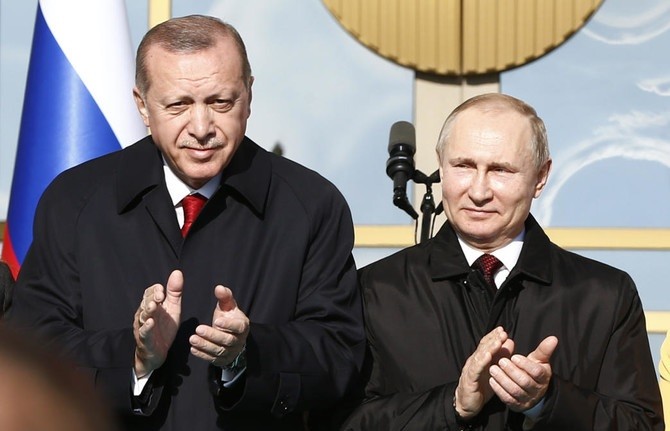
- Trump tweeted this month that US-Turkey relations “are not good at this time!” and announced tariff hikes on the NATO ally
- Switching partners is becoming a familiar dance for Turkey
UAE braced for severe weather, task force on high alert
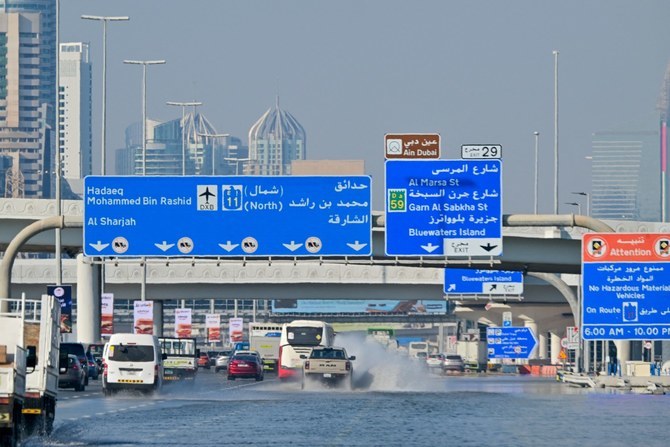
- UAE’s disaster management authority warns residents to expect rain, storms over next two days
- All private schools in UAE to switch to remote learning as precaution on Thursday and Friday
DUBAI: Challenging weather is again expected in the UAE, with parts of the country’s east coast set to experience strong winds.
The National Emergency Crisis and Disaster Management Authority said gusts of up to 40 kph were likely to impact the area on Thursday.
While the NCM forecasts less severe conditions than those in April, it has warned residents to expect rain and storms over the next two days. There is a possibility of hail in the eastern regions, possibly extending to some internal and western areas.
Clouds are expected to decrease on Friday and Saturday, with possible light to medium rain which may be heavier in some southern and eastern regions.
Government agencies are coordinating with the Joint Weather and Tropical Assessment Team to monitor developments, said a statement from the NCM.
The teams will assess the potential impact of weather conditions and implement proactive measures where necessary.
Dubai’s government announced all private schools in the UAE would switch to remote learning on Thursday and Friday as a precaution.
Authorities have urged the public to exercise caution, adhere to safety standards and guidelines, refrain from circulating rumors, and rely on official sources for information.
The UAE is still recovering from last month’s storms which caused widespread flooding, submerging streets and disrupting flights at Dubai International Airport.
Hamas official insists Gaza ceasefire must be permanent

- Suhail Al-Hindi, a senior Hamas official said the group would “deliver its response clearly within a very short period“
- He stressed the aim was “to reach an end to this war“
GAZA, Palestinian Territories: Hamas will respond to an Israeli truce proposal for Gaza “within a very short period,” an official with the Palestinian militant group said Wednesday, stressing though that any ceasefire needs to be permanent.
Hamas is considering a plan for a 40-day ceasefire and the exchange of scores of hostages for larger numbers of Palestinian prisoners.
Suhail Al-Hindi, a senior Hamas official, told AFP the group would “deliver its response clearly within a very short period,” although he would not say precisely when that was expected to happen.
Speaking to AFP by phone from an undisclosed location, he said it was premature to say whether the Hamas envoys, who have returned from talks in Cairo to their base in Qatar, felt any progress was made.
He stressed the aim was “to reach an end to this war.”
But that would seem to be at odds with Israel’s determination to push ahead with its vast ground offensive in southern Gaza.
A source with knowledge of the negotiations said Qatari mediators expected a response from Hamas in one or two days.
The source said Israel’s proposal contained “real concessions” including a period of “sustainable calm” following an initial pause in fighting and the exchange of hostages of and prisoners.
The source said Israel’s withdrawal from the Gaza Strip remained a likely point of contention.
An Israeli official told AFP the government “will wait for answers until Wednesday night,” and then “make a decision” whether to send envoys to Cairo to nail down a deal.
Jordan says Israeli settlers attacked Jordanian aid convoys on way to Gaza - state news agency
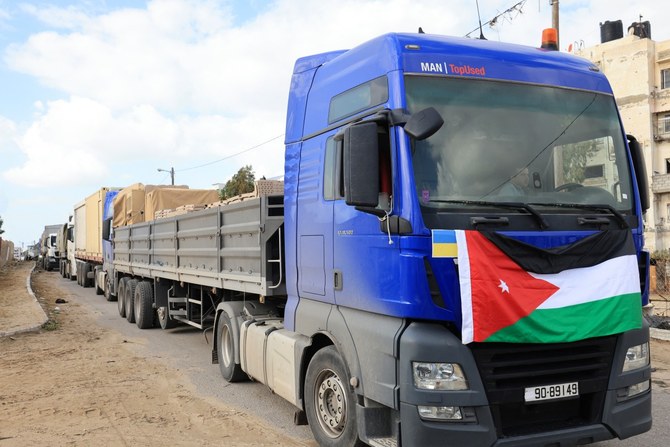
DUBAI: Jordan said some Israeli settlers attacked on Wednesday two of its aid convoys that were on the way to Gaza, the Petra state news agency reported.
“Jordan strongly condemns extremist Israeli settlers’ attack on two Jordanian aid convoys”, it said.
US surgeon in Gaza: nothing prepared me for scale of injuries

- Around 70 percent of the surgeries he performed were on injuries caused by shrapnel
- Team would deal with 40-60 patients a day
CAIRO: A US vascular surgeon who left Gaza after a stint as a volunteer said on Wednesday nothing had prepared him for the scale of injuries he had faced there.
Dozens of patients a day. Most of them young. Most facing complicated injuries caused by shrapnel. Most ending up with amputations.
“Vascular surgery is really a disease for older patients and I would say I had never operated on anybody less than 16, and that was the majority of patients that we did this time around,” Shariq Sayeed, from Atlanta, Georgia, told Reuters in Cairo.
“Most were patients 13, 14, 15, 16 and 17 years of age. Mostly shrapnel wounds, and that was something I have never dealt with, that was something new.”
In his stint at the European Hospital in Gaza, Sayeed said his team would deal with 40-60 patients a day. The vast majority were amputation cases.
“And unfortunately there is a very high incidence of infection as well so once you have an amputation that doesn’t heal, you end of getting a higher amputation,” he said.
Around 70 percent of the surgeries he performed were on injuries caused by shrapnel, the rest mostly from blast injuries and collapsing buildings.
Ismail Mehr, an anaesthesiologist from New York State, who led the Gaza mission, said the volunteer medics were “speechless at what we saw” when they arrived this month in southern Gaza.
Mehr is chairman of IMANA Medical Relief, a program that focuses on disaster medical relief and health care support and has provided treatment to over 2.5 million patients in 34 countries and counting.
He has been to Gaza several times in the past, but could not imagine what he saw this time: “Truly everywhere I saw was destruction in Khan Younis, not a single building standing.”
Out of 36 hospitals that used to serve more than 2 million residents, just 10 were somewhat functional by early April, according to the World Health Organization.
Health facilities lacked medical supplies, equipment, staff, and power supplies, Mehr said. His biggest fear now is an expected Israeli assault into the southern city of Rafah, where half of Gaza’s 2.3 million people have sought shelter.
“I hope and I pray that Rafah is not attacked,” he said. “The health system will not be able to take care of that. It will be a complete catastrophe.”
UAE braced for severe weather, task force on high alert

DUBAI: Challenging weather is again expected in the UAE, with parts of the country’s east coast set to experience strong winds.
The National Emergency Crisis and Disaster Management Authority said gusts of up to 40 kph were likely to impact the area on Thursday.
While the NCM forecasts less severe conditions than those in April, it has warned residents to expect rain and storms over the next two days. There is a possibility of hail in the eastern regions, possibly extending to some internal and western areas.
Clouds are expected to decrease on Friday and Saturday, with possible light to medium rain which may be heavier in some southern and eastern regions.
Government agencies are coordinating with the Joint Weather and Tropical Assessment Team to monitor developments, said a statement from the NCM.
The teams will assess the potential impact of weather conditions and implement proactive measures where necessary.
Dubai’s government announced all private schools in the UAE would switch to remote learning on Thursday and Friday as a precaution.
Authorities have urged the public to exercise caution, adhere to safety standards and guidelines, refrain from circulating rumors, and rely on official sources for information.
The UAE is still recovering from last month’s storms which caused widespread flooding, submerging streets and disrupting flights at Dubai International Airport.



